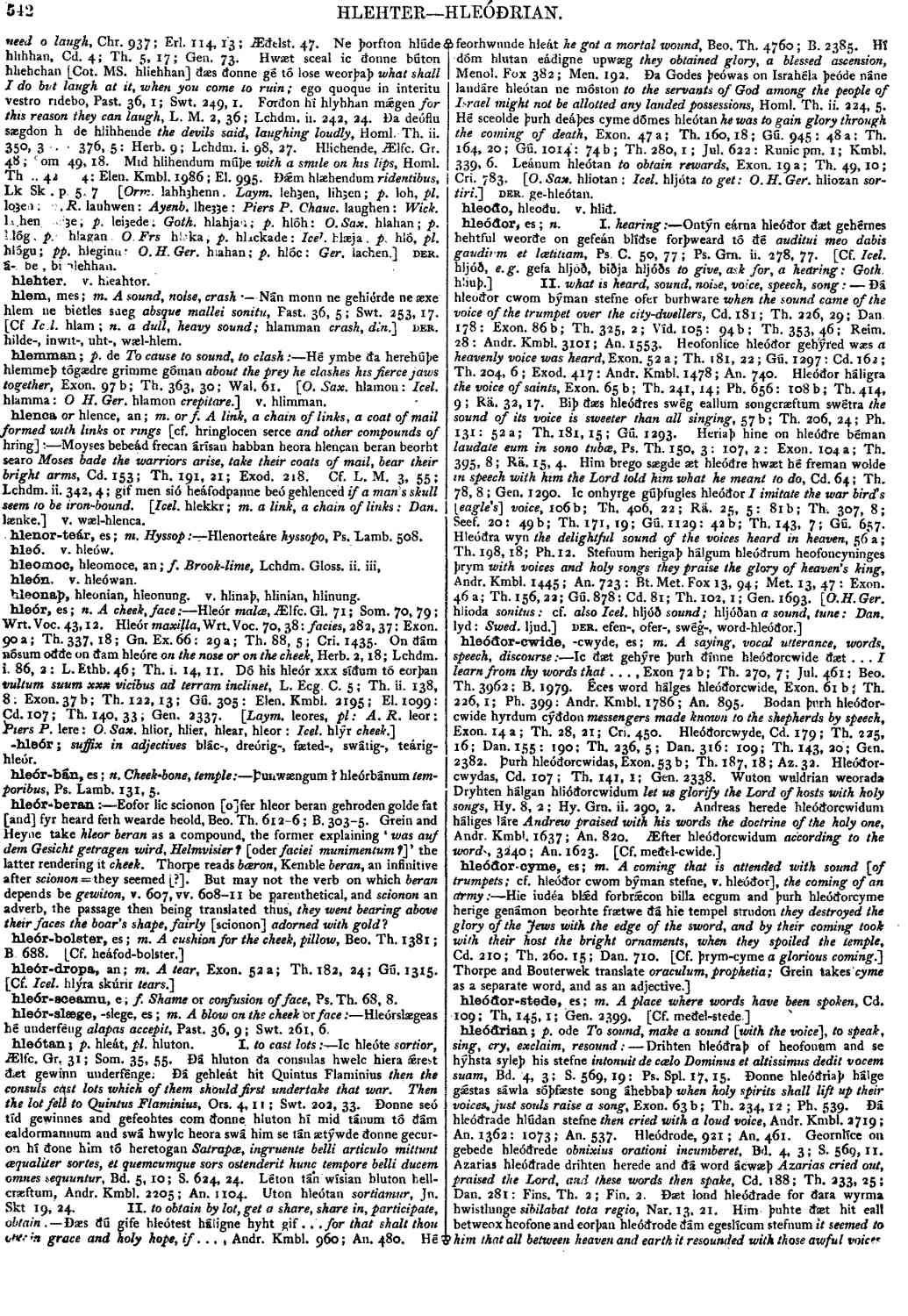hleóðor
- noun [ neuter ]
-
Ontýn eárna hleóðor ðæt gehérnes hehtful weorðe on gefeán blíðse forþweard tó ðé
auditui meo dabis gaudium et lætitiam,
- Ps. C. 50, 77; Ps. Grn. ii. 278, 77.
- [Cf. Icel. hljóð, e.g. gefa hljóð, biðja hljóðs to give, ask for, a hearing: Goth. hliuþ.]
-
Ðá hleóðor cwom býman stefne ofer burhware when the sound came of the voice of the trumpet over the city-dwellers, Cd. 181; Th. 226, 29; Dan. 178: Exon. 86 b; Th. 325, 2; Víd. 105: 94 b;
Th.
- 353, 46; Reim. 28: Andr. Kmbl. 3101; An. 1553.
-
Heofonlíce hleóðor gehýred wæs
a heavenly voice was heard
,- Exon. 52 a; Th. 181, 22; Gú. 1297: Cd. 162; Th. 204, 6; Exod. 417: Andr. Kmbl. 1478; An. 740.
-
Hleóðor háligra
the voice of saints,
- Exon. 65 b; Th. 241, 14; Ph. 656: 108 b; Th. 414, 9; Rä. 32, 17.
-
Biþ ðæs hleóðres swég eallum songcræftum swétra
the sound of its voice is sweeter than all singing,
57 b;- Th. 206, 24; Ph. 131: 52 a; Th. 181, 15; Gú. 1293.
-
Heriaþ hine on hleóðre béman
laudate eum in sono tubæ,
- Ps. Th. 150, 3: 107, 2: Exon. 104 a; Th. 395, 8; Rä. 15, 4.
-
Him brego sægde æt hleóðre hwæt hé freman wolde
in speech with him the Lord told him what he meant to do,
- Cd. 64; Th. 78, 8; Gen. 1290.
-
Ic onhyrge gúþfugles hleóðor
I imitate the war bird's [eagle's] voice,
106 b;- Th. 406, 22; Rä. 25, 5: 81 b; Th. 307, 8; Seef. 20: 49 b; Th. 171, 19; Gú. 1129: 42 b; Th. 143, 7; Gú. 657.
-
Hleóðra wyn
the delightful sound of the voices heard in heaven,
56 a;- Th. 198, 18; Ph. 12.
-
Stefnum herigaþ hálgum hleóðrum heofoncyninges þrym
with voices and holy songs they praise the glory of heaven's king,
- Andr. Kmbl. 1445; An. 723: Bt. Met. Fox 13, 94; Met. 13, 47: Exon. 46 a; Th. 156, 22; Gú. 878: Cd. 81; Th. 102, 1; Gen. 1693.
Bosworth, Joseph. “hleóðor.” In An Anglo-Saxon Dictionary Online, edited by Thomas Northcote Toller, Christ Sean, and Ondřej Tichy. Prague: Faculty of Arts, Charles University, 2014. https://bosworthtoller.com/19232.
Checked: 0